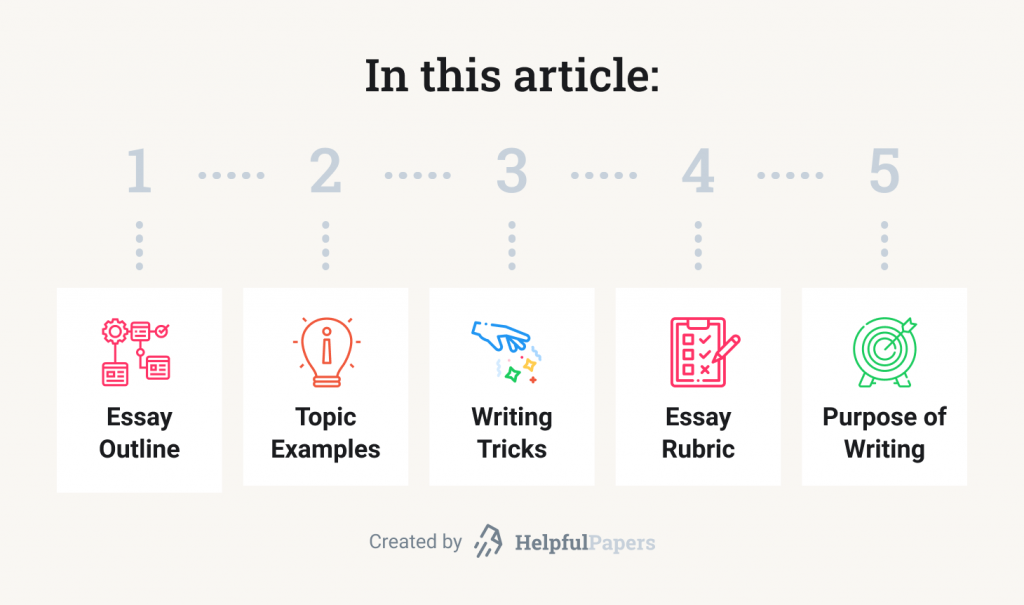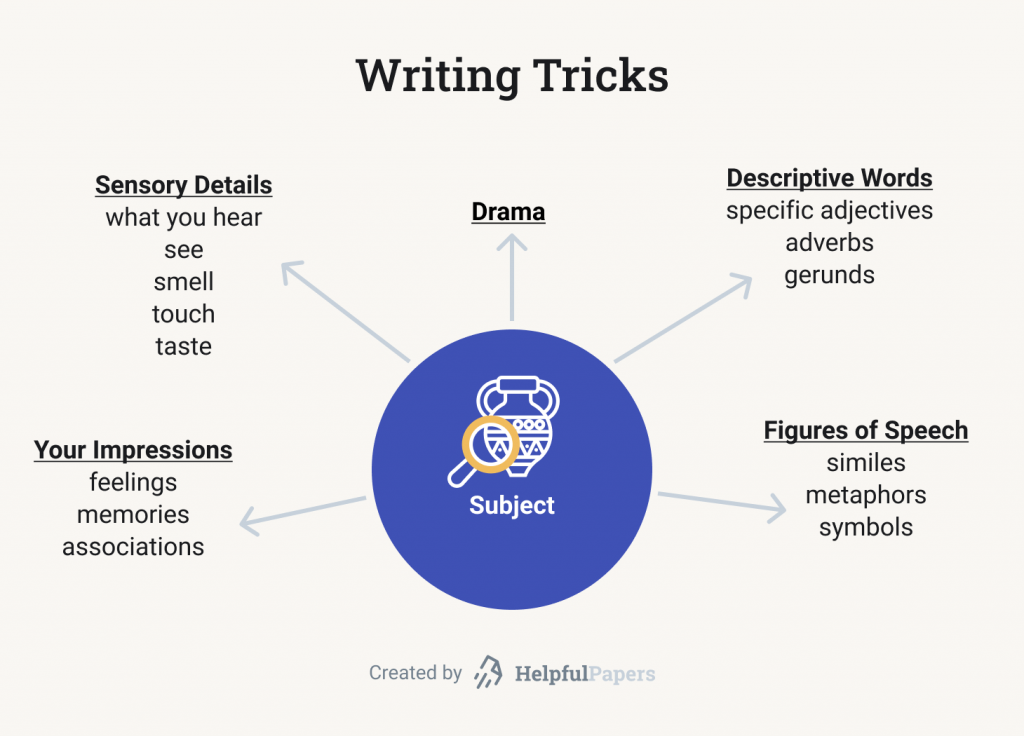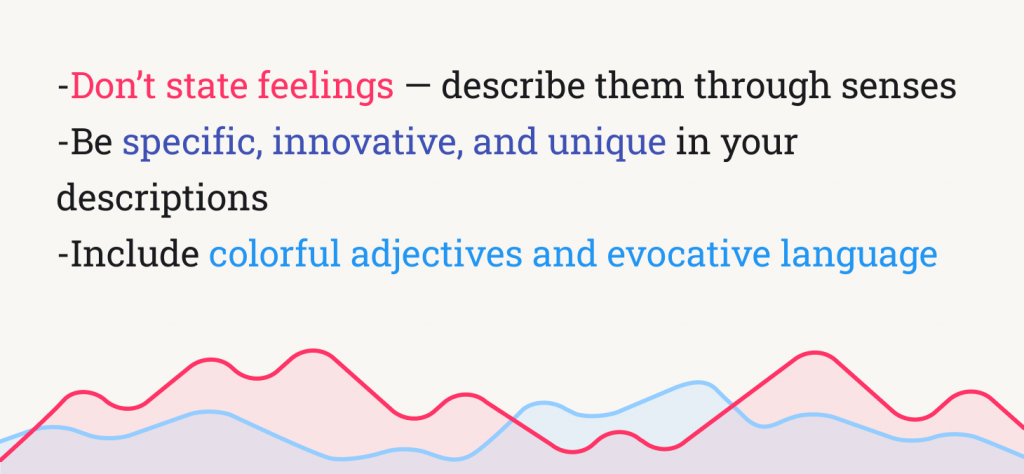If your task is to write a descriptive paper, it is a fantastic chance to apply your (any kind of) writing skills.

Being able to write well is a scarce skill. Not everyone can be a good writer and boast about their academic papers. We understand that – academic writing has many rules and limits for students.
Check out the following free descriptive essay example with comments and learn how to draw true masterpieces with your words.
⚡ BONUS: Descriptive essay rubric to see the text from a teacher’s angle.
⭐ An Excellent Example of a Descriptive Essay
Let’s start with the example of simple but good descriptive writing. Below you can see how to integrate different techniques in the text.
“The Lonely Life of a College Textbook”
To fix this knowledge, here’s a helpful scheme to remember.

🎯 What Is the Purpose of a Descriptive Essay?
Before we get to the detailed steps of writing, here is a crucial thing to figure out.
What do we actually want to achieve with a descriptive paper?
Now, the answer is not that simple.
- A descriptive essay gives a detailed description of a person, object, place, or event.
- Words create a picture in readers’ minds by engaging the five senses: smell, taste, touch, sight, and sound.
- Readers should share and feel the author’s emotions.
Simply put, you are not just a writer but rather a psychologist. Reaching people’s emotions is not as easy. However, the appropriate and vivid word is the best weapon for this purpose.
📍 Descriptive Essay Outline
Of course, fiction writing and highly creative and free formats don’t need a defined outline. However, if your task is to write a descriptive essay according to academic norms, here is what you need to know.
Introduction
This is a part that requires the most significant effort. An introduction is an opening paragraph that catches your reader, and the best way to start a descriptive essay is by using a narrative hook!
- Check out our text Catchy Hooks for Essays: Guidelines, Ideas, Samples, and choose your favorite.
Body
Depending on the format of your writing, main paragraphs vary by size, content, and sequence. Nevertheless, here is the universal feature:
Start each paragraph from the topic sentence; it will give the reader a broad view of the subject → Provide details as you develop your thoughts.
Be sure to follow one simple rule of thumb: show, don’t tell.

Conclusion
Write a conclusion that restates your main ideas. Summarize your key points, and don’t introduce any new thoughts. Try to leave a reader with the feeling of having learned something.

💁🏽 Boost Your Descriptive Essay with These Tips
Descriptive essay writing can be rather challenging unless you have a lively imagination. You will have to work very hard to create something that your reader will believe and enjoy.
You may need a few practical hints on descriptive essay writing:
- Choose a good topic and an angle for it.
- Imagine what you’re describing in the tiniest detail.
- Show, don’t tell.
- Feel, smell, see, touch, and/or taste your object.
- Make your readers feel what you feel.
- Incorporate a variety of transition words to connect your ideas.
- Use comparisons to make your descriptions more vivid.
- Include a variety of clauses and compound sentences to express your thoughts.
Now you know more about how to draw with words and what you need for writing a descriptive essay that rocks.
Need more practical tips on writing an excellent descriptive essay? Keep reading!
🏴 Descriptive Essay Topics: Mistakes
Writing a descriptive essay seems relatively unconstrained and liberal, right?
Don’t rush!
Here are some common mistakes in writing descriptive essays you should avoid:
- Not having a key idea. You should focus on one main idea when writing a descriptive essay and make it clear to your readers. “Describing something” is a bad idea.
- Using unnecessary adjectives in your descriptions. Try to describe the object or person using your emotions and feelings. Don’t just give a long list of adjectives from Thesaurus.
- Having too many negative adjectives in your descriptions. You should try to use mild language instead. Euphemisms over dysphemism!
Having introduced you to the main rules of writing a descriptive essay, we now want to show you an opposite vision of your text.
💯 Descriptive Essay Rubric
In academic writing, a rubric is a set of criteria used to evaluate your text.
Thus, every writing format has its aspects that are key to grading. Usually, teachers have a whole table with these criteria; each has a specific point scale, according to which your text is assessed.
Now.
Let’s figure out what the teacher will most likely pay attention to in your descriptive essay.
Organization
- State the key topic and outline the structure of a text. Support the main idea with some background, and don’t forget about the right essay hook!
- Sequence. The subject is disclosed comprehensively. All the features and details are in a logical order and work effectively.
- The final part wraps up the discussion and makes sure that the reader understood the author’s vision.
Creativity
- Is it creative? Sparkling? Is it related to your topic?
- Supporting details. Did you include the elements that help readers to visualize and feel your subject?
- Make sure that your writing has your voice and experience. Ideas are entirely yours, as well as language.
Formality
- Grammar & Spelling. Don’t forget to proofread and polish your text. Mistakes and typos create a negative attitude in a reader.
- Formatting. Ensure that you followed all the formal requirements your instructor provided: Number of words, font size, font style, etc.
You may go through these points of the descriptive essay rubric after writing. Keep in mind to revise the text from all angles: organization, creativity, and formality.
🧑 Descriptive Essay Topics about a Person
- Your ideal friend.
- A description of self-directed learners.
- Your worst enemy.
- George W. Bush’s personality description.
- A stranger in the crowd.
- Personality description based on the Big Five model.
- Someone you respect.
- Emmett Taylor’s type: A personality description.
- Someone you don’t respect.
- An older person with depression.
- A person you will never forget.
- International students in the US.
- Your ideal self.
- A person with narcissistic personality disorder.
🏝️ Descriptive Essay Topics about a Place
- Your dream house.
- What does a college mean to a student?
- Moving to a new city.
- The Guggenheim Museum as a work of modern architecture.
- A place you visited as a child.
- Mina – Saudi Arabia tent city.
- An inspiring view.
- Museum of Fine Arts — West Wing and renovation.
- A place that makes you feel free.
- Yellowstone National Park.
- Which town would you like to visit?
- Design and layout of a men’s clothing store.
🚵 Descriptive Essay Topics about an Experience
- An immigrant’s experiences in America.
- A life-changing experience.
- Writing process description and steps.
- A childhood memory.
- Student’s experience at English Composition class.
- Your day at school.
- Teen life after college description.
- Your first date.
- Virtual Career Center Visit: The Berkeley City College.
- Learning a new language.
- Interview experience with an aging person.
- The most memorable Christmas tree in your life.
- My experience learning a second language.
- Childhood traumatic experience.
- Patient experience of illness and self-transformation.
🎈 Descriptive Essay Topics about an Object
- Your favorite childhood toy.
- Description of the object: A silver tray with carving.
- Your musical instrument: Its shape, sound, and related experiences.
- A piece of clothing that elicits your emotions.
- The Barbie doll: A child’s toy description.
- A memorable tree in your neighborhood.
- A painting that impressed you.
- Money and gifts: Things create people as much as people make them.
- Your favorite dish: How it looks, smells, and tastes.
And we are done!
Use our descriptive essay example and follow the writing prompts to write your perfect descriptive essay on any topic.
Don’t underestimate the creativity and basic rules of writing!
Good luck 🍀